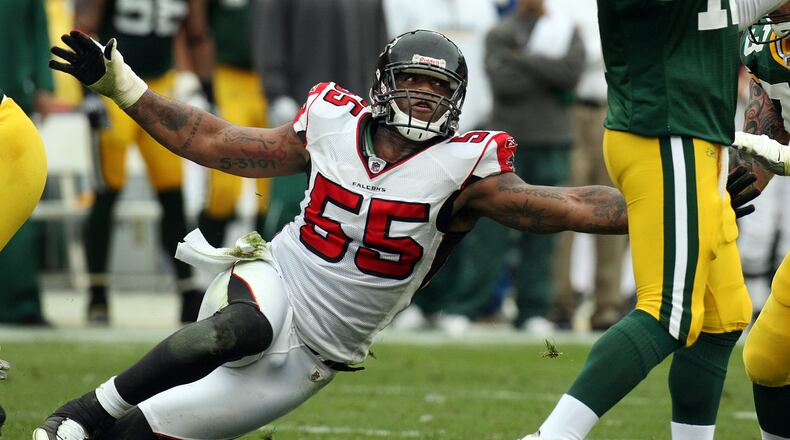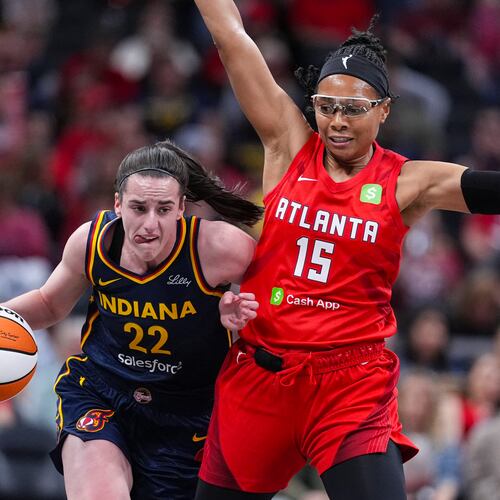Not too long ago, John Abraham was one of the NFL’s leading pass rushers and a mainstay for a Falcons team that was a drive away from a trip to the Super Bowl.
Today, he’s just John.
Some days, Abraham is hanging out at the pool at his metro-Atlanta apartment complex, talking to new and old friends. Other days, the 41-year-old former player prefers to be by himself, fighting off headaches, trying to find ways to relax and calm his mind.
Five years removed from the game, the mental and physical effects of a 15-year NFL career that ended with a major concussion still linger. But he feels like he’s starting to get a grip on who he wants to be.
“I was being myself for five years,” Abraham said. “Most of the time, I’ve just been really trying to hang out and get to be around people, be around my kids and stuff like that. (But), I was also getting my mind and mental state right so I can be able to talk to people.”
Abraham will tell you that hard times aren’t uncommon in his life. He lost his grandfather, Bert Josey, while with the Falcons in 2008 or 2009. He can’t remember the date and said he thinks he blocked out of his mind due to grief. His mother, Maggie Abraham, who raised him alone, was diagnosed with cancer in 2010.
While those moments were significantly troubling, it wasn’t until Abraham’s career was nearing its end when he started to have problems of his own. Success came with a price.
There are two main sources of pain Abraham had to fight through when he evaluated the end of his career and his life since. There was the mental anguish of being cut by the Falcons in 2013 because of his age (34). It was a team for which he played on a sprained ankle for in the 2012 playoffs when the Falcons were eight yards away from a win over the San Francisco 49ers in the NFC Championship game. It was also the physical pain from the concussion he suffered in 2014 with the Arizona Cardinals in the first game of the season.
Credit: Curtis Compton
Credit: Curtis Compton
Learning what makes him happy
Abraham, who is still the Falcons’ career sack leader, with 68-1/2 during his tenure, admitted he was depressed and “heartbroken” after the Falcons cut ties with him.
He recalls his weight falling to about 195 pounds and drinking every day, something he thought would help him solve his problems. He was arrested for a DUI in 2003 while with the New York Jets as well in 2014 when he played for the Cardinals.
“(Alcohol) was my own painkiller back in the day. I guess you could say, compared to like waking up and going to do this, it was just like, let me go just drink,” Abraham said.
He admitted that as he got older he learned alcohol wasn’t a permanent solution to the problem. He knows what makes him happy now, and part of that is talking to people.
After appearing on several radio segments throughout his career, Abraham showed interest in one day having his own show, a chance for him to express himself, get to know others and for people to see him as more than just a former football player.
“When I’m talking, getting to know people and trying to be myself, not trying to do what everybody else tells me, that tends to slow me down,” Abraham said.
The good days and the bad days
For Abraham, what’s made the transition from chasing down quarterbacks to being a regular member of society hard is that he struggles with the effects of his concussion.
“Some of my days are not that great,” Abraham said. “Things are up and down. … For me, I think it would be hard to have a regular 9-5 (job) now because I don’t know what days are good days and what days are going to be bad.”
He explained that the NFL has the means to help former players with concussion symptoms if help is requested. It’s difficult, he said, because the league has so many people to look after.
Often, it’s up to the individual, in a way, to look after themselves.
“If you don’t really go ask for it, they might think you’re OK,” Abraham said. “A lot of guys, when they’re done with football, they don’t ask for help. Because they never really used to back in the day.”
When asked if he thought he’s got it under control now, Abraham said he thought he “mostly” does. But he didn’t when he first got out of the league.
“I had a lot of rage, I guess, inside me. Lot of anger, probably penned up frustration and I didn’t know how to handle it,” Abraham said.
Credit: Curtis Compton
Credit: Curtis Compton
Another arrest occurred in 2012, when Abraham was on the scene of an attempted suicide and refused to be stopped by police. He told The Atlanta Journal-Constitution he was just tired and wanted to go home. In his mind, those were the type of situations he said he would walk away from today, but just didn’t, or couldn’t, in the past.
But Abraham, now that he said he’s given his mind a chance to calm down, is starting to see a correlation.
“Looking back now, a lot of the stuff I went through, I can see the reason why,” Abraham said. “My aggression.”
On a Saturday in mid-July, Abraham, wearing swim trunks, a red shirt and sandals, sits around a table with friends in a gazebo adjacent to his apartment complex’s pool. Some of them he’s known for a while, such as Bobby Pinder, 47, a former diplomat in the Bahamas and Shontele Poindexter, 39, a bodybuilder. Other people he’s just met for the first time.
Poindexter, sitting across from Abraham, said Abraham motivates her. Pinder, who sits to his left, gives him advice.
“In life, you don’t have disappointments, all of it is re-routing,” Pinder tells him.
Abraham, these days, lives life in a conundrum, trying to balance his social life with his needs. He must deal with in his symptoms. He wants to stay out of any potential trouble, not wanting to find himself in a bad situation again after all he’s experienced.
“It’s like a double-edged sword because I like being around people, but I also need to be by myself,” Abraham said. “If something happens, I don’t have to worry about (it).”
About the Author
Keep Reading
The Latest
Featured




